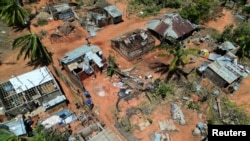Mozambique began constructing homes for victims of Cyclone Chido this week after the storm swept through three of the country's northern regions Sunday, killing at least 70 people and injuring 600 others as it left behind a trail of destruction.
On a visit to affected areas, Trade and Industry Minister Silvino Moreno said that the government is working to provide aid to storm victims and that international partners are pitching in to help.
Addressing the media after a stop in the province of Nampula, one of the regions affected by the cyclone, Moreno said the priority is constructing shelter with resilient materials. He said the goal is to avoid the destruction of homes built with poor material.
Almost all of the houses in affected areas were constructed with mud and reeds that never stood a chance against the powerful cyclone.
Moreno said the people need better construction training.
Before hitting Mozambique, Cyclone Chido caused significant devastation in Mayotte, a set of French islands. This resulted in fatalities, infrastructure damage and increased risks for vulnerable communities, including asylum-seekers and refugees, according to humanitarian agencies.
In southern Malawi, the storm brought strong winds and rains, leading to the destruction of houses and infrastructure in several areas.
Mozambique’s meteorology agency said the country should expect more storms during the next three months of the rainy season and called for better preparation.
According to UNICEF, at least 174,000 people have been affected overall, but the numbers may increase as assessments continue.
In addition to homes damaged, at least several thousand classrooms were destroyed and 20 health facilities hit.
UNICEF’s field office head in Mozambique’s Zambezia province, Michael Chimedza, told VOA that his organization has requisitioned items so it can immediately respond to 50,000 people. He said the agency has provided funds for response training at the local level.
Besides Nampula, the cyclone tore through Cabo Delgado and Niassa provinces, leaving more than 25,000 families without electricity and damaging key infrastructure, including health units, roads and water supply sources.
In a region already fighting a cholera outbreak, the latest devastation creates an ominous likelihood that the outbreak will further worsen, aid agencies said.




